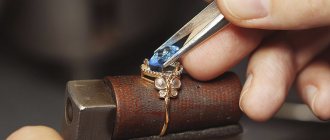Author: ProfGid
A jeweler is a master who creates jewelry and products from precious and semi-precious stones, gold, silver, enamel and other metals. Specialists work in specialized workshops and manufacturing plants, repair jewelry, and develop their design. We talk about what subjects you need to take to become a jeweler, where and what programs to study after 9th and 11th grades. By the way, in 2022, the ProfGid career guidance center developed an accurate career guidance test. He himself will tell you which professions are suitable for you, and give an opinion about your personality type and intelligence.
- Career Guidance Test
Find out which professions are suitable for you and what personal qualities contribute and hinder this.
College of Decorative and Applied Arts No. 36 named after. Carla Faberge
Here you can not only master the necessary techniques, but also develop your creativity and learn how to create designer jewelry. Children interested in the use of information technology in jewelry can take 3D modeling courses at college and learn how to create jewelry designs using special computer programs. To enter here, you must pass two entrance tests: drawing and metalwork. After each exam, interviews are held at which the advantages and disadvantages of the completed tasks are discussed. Applicants who have graduated from art school can have a presentation of their portfolio instead of a drawing exam. You can study on the basis of the 9th and 11th grades - in the first case, the training will take three and a half years, in the second 10 months.
Concept
The profession of “jeweler” presupposes the presence of artistic skills and the ability to grasp the aesthetic preferences of the customer. A person who has this specialty is able to perform manipulations to mount jewelry. He knows how to secure inserts in a product and carry out other operations for the manufacture and repair of jewelry.
In addition, such a specialist is capable of not only being an employee, but also starting his own business. Namely, a jewelry workshop. Approximately this concept is given in specialized courses.
In any training center, when a future student is asked what prospects the profession of a jeweler offers, they will answer: high wages, demand. But, of course, not everyone can master this creative specialty. Just like not everyone is given the opportunity to become an astronaut, lawyer or assistant driver of a long-distance train.
The profession of “jeweler,” the training of which in Russia is provided both on a paid and budget basis, has both advantages and disadvantages. Let's look at the pros and cons of a goldsmith's working days.
College of Arts and Crafts No. 59
Along with the Carl Faberge College, it is the most popular specialized secondary specialized educational institution in the field of jewelry. At one time, Sergei Dunin, a master engraver, teacher and author of numerous textbooks on jewelry and engraving, studied here, as well as current engineers from leading jewelry factories. Among the innovative educational methods, the technical school practices preparation for entrepreneurial activity in the field of decorative and applied arts. Like the students of College No. 36, students are given the opportunity to demonstrate their abilities in creative competitions. The duration of training in the specialty “Jeweler” is 1 year 10 months on the basis of the 11th grade and 3 years 6 months on the basis of the 9th grade. For successful admission, no additional creative tests are required.
Pros and cons of the jeweler profession
Even against the backdrop of financial disasters, jewelry does not lose its value. For this reason, people capable of creating or restoring such works have always been in demand, and there is no reason for the trend to change. An expert who knows various techniques and methods of working with materials and has a high level of skill will easily find a good place. Jewelers traditionally make good money. The average income of a master without special regalia is 50-90 thousand rubles. A well-known expert will often receive hundreds of thousands of rubles for his work.
The main disadvantage of this route is the potential health hazard. Jewelers have to sit in one position for several hours in a row, straining all the muscles of the body. Over time, this leads to problems with the joints and spine. Physical inactivity often causes an employee to gain weight. Also, while working, craftsmen are forced to strain their eyes greatly, which threatens to reduce visual acuity.
If a jeweler does not have talent and aesthetic taste, he will be forced to perform exclusively technical actions. This will not bring him fame or money. You also need to prepare for the fact that customers may be dissatisfied with the work performed. There will always be critics who belittle the merits of masters and speak negatively about their creations.
Moscow Polytechnic College
Training in the profession of “Jeweler” is carried out here only on the basis of the 9th grade and lasts for 2 years and 5 months. Admission of applicants is based on the results of the State Examination Test; the college does not conduct additional independent tests in this area. Upon completion of training, the graduate receives the qualification “Insert Cutter” - mainly his future work will be related to precious and semi-precious stones. The Moscow Polytechnic employs most of its graduates, and those who wish to study further enter universities under a shortened program. Among the higher educational institutions where young jewelers can continue their career are the Moscow State University of Design and Technology and the Moscow State University of Culture and Arts.
Courses
Often a person graduates from a university, spends several years doing work that gives him neither pleasure nor well-being, and only then decides (if he has the courage) to change his profession. For example, become a jeweler.
In this case, there is no need to submit documents to the Academy. Stroganov or another educational institution listed above. It is enough to complete specialized courses. Finding information about them is not difficult. However, it is better to opt for additional education programs offered by reputable universities. Along with them, there are also training centers that train personnel for the jewelry industry. Among them:
- British Higher School of Design.
- Author's courses at MSTU. Kosygina.
- Russian Academy of Crafts.
- "Glass Academy"
The course of study lasts from five to twelve months. Students master a basic range of knowledge, which in the future allows them to occupy their own niche in jewelry production. And finally, there is another way to gain knowledge in this area. Namely, to become an apprentice to an experienced jeweler.
The barrier to acquiring knowledge and skills is, first of all, the lack of a role model. But if there is such a master, and he is not averse to sharing his experience, then halfway to obtaining a highly paid and creative profession as a jeweler has been passed. After all, theoretical knowledge can be obtained independently. Not everyone has the opportunity to watch a professional work.
College of Automation and Radioelectronics No. 27 named after P.M. Vostrukhina
Almost all areas of study here are related to technology; only two professions stand out from the general list: environmental engineer and jeweler. The curriculum includes a lot of work in machine tool laboratories and jewelry workshops. The key task of preparation is to get the hang of it. It is worth noting that there are special groups for students with hearing problems. After graduating from college, young jewelers can continue their studies at a university: KAIR No. 27 cooperates with the Faculty of Technology Design of the Moscow City Pedagogical University. For those who do not plan to receive additional higher education and want to plunge headlong into work, the college promises guaranteed employment. You can enroll here both after 9th and 11th grade. There are no special requirements for jewelry applicants.
Flaws
Being a jeweler also has its downsides. And first of all, they include a sedentary lifestyle. Jewelers strain their eyes every day and receive, albeit minor, hand injuries. Burns from chemicals are also possible. To all of the above it is worth adding great responsibility.
A jeweler who evaluates expensive items has no room for error. After all, it can lead to huge expenses and loss of reputation of the enterprise.
An applicant who has decided to become a jeweler should answer the following questions:
- Does it match your personality traits?
- Do you have enough perseverance?
- Can you become a specialist in a narrow focus (for example, work exclusively with cold enamel).
- Will you be able to evaluate jewelry products?
Like any other profession, the profession of “jeweler” requires special personal qualities. Reviews about this craft are sometimes negative. But, as a rule, those who choose this profession by mistake, without analyzing their own abilities in time, leave it.
We figured out what the profession of “jeweler” is. Where to study? What is the cost of training?
5. Polytechnic College No. 13 named after. P.A. Ovchinnikova
The “golden hands” of the college are specialists in metalworking, so jewelry making is one of the priority educational areas. As in the case of College No. 27 and the Polytechnic, the main emphasis here is on honing the technique of working with metals and stones and developing the necessary professional skills. But to say that they teach here not to create, but mainly to craft and make products according to a sample, would not be entirely correct - quite a lot of time is also devoted to training in the field of jewelry design, including computer design. At college, students carry out production orders from various enterprises. On the basis of the 9th grade, training lasts 3 years and 5 months, on the basis of the 11th grade - 1 year and 10 months. Admission is carried out without entrance exams based on the results of the State Examination and Unified State Examination.
Advantages
Theoretically, anyone can become a jeweler. In addition, its advantage is the possibility of continuous development. Anyone who is not afraid of painstaking work and working with stones and metals, having received a secondary vocational education, can safely apply for a place in one of the jewelry enterprises.
If you have an artistic gift, you should think about a more serious education. You can choose a university whose list of programs includes training in design with a jewelry focus.
Thus, two types of specialists can be distinguished. The first ones create, create something new. Their work is similar to the skill of a sculptor or painter. And, of course, it is impossible to learn it without artistic abilities. The latter restore, put into proper shape, evaluate, and perform the duties of a merchandiser in a pawnshop.
Where do jewelers work?
Depending on the level of professionalism, work experience and goals, jewelers can work in factories or factories, workshops, or private studios. Here you can not only hone the skills acquired at a university or in courses, but also learn to become a professional under the guidance of a master.
In large enterprises, the work of employees is most often strictly divided. Some cast blanks, others carry out preliminary processing of materials, others cut stones, etc. In small studios, jewelers usually work separately on their pieces, fulfilling private orders. Free artists with a high level of qualifications and a client base operate on the same principle.
Famous representatives of the profession
Carl Faberge
Famous Russian jeweler
The head of a family company and a dynasty of jewelry craftsmen. He is the creator of Faberge eggs, which are highly prized by collectors around the world.
More details
Daniel Swarovski
Austrian engineer
Founder of the Austrian crystal empire Swarovski
More details










